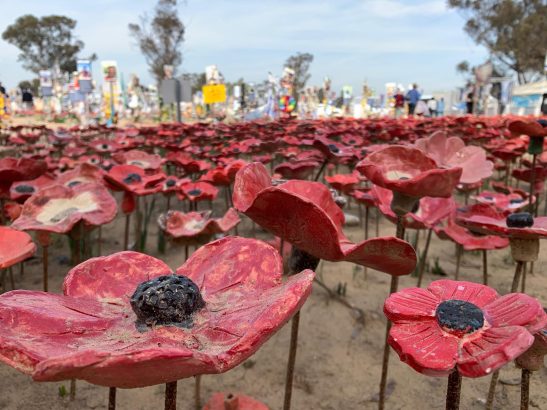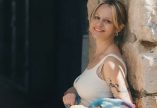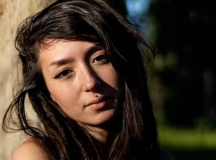Ceasefire Announced (15 January 2025)
I’ve been holding my breath since 7 October 2023.
Tonight, in the back of a taxi in Jerusalem, I finally exhale – a flood of tears breaking loose as the news arrives.
It’s an ugly cry: I think of all those who were slaughtered on that cool blue morning.
The raw stink of fear.
Mouths stretched into rictus, terror burned into their final moments.
I think of our soldiers and their parents and partners who haven’t slept since they went into battle.
I think of our hostages. Their families.
Hearts clenched in waiting, hands reaching for something – anything – that might be hope.
I think of my friend Vivian Silver. Of Hersh. Of all the others murdered.
I think of Heba – an artist in Gaza, a mother, a woman I admired. Just a few weeks before the war, we messaged about our children.
She is gone.
I think of my son’s best friend’s big sister, Shiraz Brodash, murdered with her boyfriend Avshalom Peretz by the Sha’ar HaNegev junction as he tried to drive her to safety.
I think of the hostages.
Agam. Liri. Naama.
The Bibas family. Keith.
Strangers I love as if they are my own.
And in the taxi, I weep.
Rivers down my face, flowing into a primordial ocean.
And in the review mirror, I see the driver – Muhammad – wipe away tears, too.
‘My mother’s family is in Gaza,’ he tells me. ‘What’s left of them.’
Our rivers of tears know no borders.
The Weight of These Days (20 January)
It’s hard to put into words the gut punch of these eternity of days – the horrors of 7 October, the grief, the rage, the unrelenting ache. And now the impossible arithmetic of swapping convicted murderers who robbed families of futures for the chance, the chance, to maybe bring a baby home. To bring someone’s mother home. To bring a husband, a daughter, a grandfather home. Alive.
I think of the hostages, wide-eyed and terrified. The Bibas children who don’t yet know how broken this world can be. Grandparents who have already seen too much. Civilians, yanked from their lives, thrown into a maw of darkness.
And now, I see the faces of the terrorists who will walk free. Monsters. The kind of people whose names should be curses. And my heart lurches because how – how – is this the equation we’re forced to solve?
Anywhere else in the world, if someone kidnapped a random person from their home, the demand for dozens – hundreds – of killers in exchange would be laughed out of the room. But here, this is the cost of being who we are. It’s the cost of choosing life, even when it doesn’t feel fair. Even when it rips us apart.
It’s okay to feel everything all at once right now. You can feel the rage – white-hot, searing, justified – because the release of these terrorists isn’t justice. It’s not even close. You can feel the heartbreak for the families of their victims, who will now watch their loved ones’ killers walk free. And you can feel relief, even joy, because someone’s child will come home. Because someone’s mother will hug her kids again. Because life is still worth everything, even when it comes at such an unthinkable price.
This is what I tell myself.
I want to scream for the victims. For their families. For the empty chairs at the Shabbat table, the holes that will never close. I want to scream for the hostages who are still out there, waiting in darkness, and for the ones who won’t come home. And yes, I want to scream for the families who will embrace their loved ones again – because those reunions should never have been necessary.
This is the paradox of living here. The weight of the impossible choices we make, the jagged edges of moral clarity. The knowledge that this tiny, stubborn place will always pay the price for valuing its citizens life in a way that the rest of the world doesn’t understand.
But through the rage and the heartbreak, through the impossible choices and the heavy cost, I hold onto one thing: we are still human. We still feel, even when it hurts. We still hope, even when the odds are impossible. And we still choose life, again and again and again. Because that’s who we are.
From Jerusalem to the South: Bearing Witness (21 January)
Descending from Jerusalem is always a kind of rupture for me – leaving behind the high stone ridges, the familiar contours of my city, to enter a landscape that holds so much grief. This time, it was my first journey south since the war began. The land stretched out before me, deceptively peaceful, and I felt it in my body – the weight, the knowing.
At the Nova site, the wind moves through the trees, through the makeshift memorials.
Trinkets and notes left at each station reflect the personalities of those taken – small tokens of love, a desperate attempt to say I see you, I remember you.
And then the incongruous, the unexpected: a quorum of Orthodox men standing in prayer. Their black coats stark against the landscape, their murmuring voices rising in the place where young people once danced, where music once filled the night air. The contrast is staggering. A site so profoundly secular now transformed, if only for a moment, into a place of Jewish ritual.
I think of the old Jewish joke – ‘it might lead to mixed dancing’ – a wry nod to how some religious communities enforce separation between men and women. But in the end, all I see is love, grief, and compassion.
Isn’t this what we are learning, again and again? That we must stand together and hold one another, that we must mourn together, even when our ways of living – of believing – could not be more different?
We stop by the Shaar HaNegev junction where Shiraz was murdered, and I can feel evil, viscous all around me.
I remember the day they found Shiraz’s body.
She was the cool big sister – the fun babysitter.
‘What do you remember about Shiraz?’ I asked my son when he went to visit his friend, her younger brother.
‘She was really nice,’ he said. ‘She was funny and she drove me home sometimes when I would play at their house. I remember when she dropped me off, she never drove away until she could make sure I got into the house, and this one time, a car was blocking and she couldn’t see if I got in so she parked and followed me to the door.’
A moment passed.
‘Mom, are you crying?’
We need to remember that on 7 October it wasn’t just 1200 people murdered. It was one and one and one and one and one and one and one and one and one and one and…
And one.
Later on, I stand at an overlook – the Black Arrow Memorial, a monument for fallen paratroopers from the 1950s. There’s also a playground, soldiers sitting on picnic benches, eating sandwiches. The air hums with bees moving from rosemary blossom to rosemary blossom, carrying pollen, making something new. Before me, the horizon is broken in jagged pieces, the ruins of Gaza’s skyline visible in the distance.
Next to me, a woman stares out at the same view and exhales a question into the wind: ‘How can it be that there are still hostages there, just beyond that fence, and yet we have allowed buildings in that hellscape to remain?’
I think of our brothers and sisters still captive. And I think, too, of the people of Gaza – of an entire generation destroyed.
And yet.
The almond trees bloom. The bees keep moving. The wind still sings through the eucalyptus.
A little kid runs toward the playground.
There is renewal. There is always renewal.
The Unbearable Paradox: Joy and Grief Intertwined (25 January)
Every hostage is my brother or sister. That’s the simple truth. But some stories hit so deeply they carve themselves into me.
Hersh, for one. Forever Hersh. Always Hersh.
My friend Vivian Silver. We clung to hope that she was a hostage and would come home alive one day, only to learn that she was murdered on 7 October, left for ash.
Shani Louk – whose fate we didn’t know for sure at first, and despite the overwhelming evidence of the brutality she faced, we still hoped that maybe, just maybe she was alive.
The Bibas family – those sweet babies and their parents.
Little Emily Hand, who we thought was murdered but was actually alive and released in an earlier hostage released.
And Naama Levy.
The last time we saw Naama, she was being forced onto a truck, soaked in blood. The image reminded me of old Holocaust footage – in obscene technicolour.
But today, she’s coming home.
Naama, along with Liri Albag, Daniella Gilboa, and Karina Ariev, will be released today. These women – young, vibrant, full of life – were taken into the depths of hell and have endured the unimaginable. And now – please G-d – they are walking back into the arms of those who love them.
I can only begin to imagine the joy their families must feel, that trembling anticipation as they prepare to hold them again, to see them, to breathe them in. And yet, I can’t stop thinking about the families who are still waiting – watching, aching, hoping.
For every hug that happens today, there’s another family left in anguish, wondering when it will be their turn, if it will be their turn.
This is the unbearable push and pull of it all: the joy and relief for some, the grief and longing for so many others. We don’t know who will come home next, or how long it will take, but one thing I hold onto is this: while there is life, there is hope.
For every hostage still waiting, for every family still clinging to the thin thread of possibility, we will not stop. We will not let the world forget them.
They are our brothers. They are our sisters. They are us.
And we will not rest until they’re all home.
The Taxi Driver’s Reckoning (28 January)
The taxi weaves through Jerusalem’s late afternoon traffic, past stone buildings glowing golden in the dying light. The driver is quiet at first, his hands steady on the wheel, his face drawn with something between exhaustion and resignation. Eventually, he speaks, his voice low and rough, as though he’s been turning these words over for too long before deciding to let them out.
His cousin is getting out of prison today. A distant cousin, but family nonetheless. He won’t say what attack landed the man behind bars, only that he was young when it happened, and now he’s coming out an old man.
‘I told him,’ the driver says, his eyes flicking to me in the rearview mirror, then back to the road. ‘We must not behave like animals.’ His words are heavy, deliberate, carrying the weight of someone who has lived through too much.
His cousin, he tells me, is shaken by 7 October. Dismayed, even. It is not the future he thought he was fighting for when he went to prison many years ago. The war that followed, the bodies of children pulled from the rubble – this is not what he imagined when he first picked up a weapon.
The driver clears his throat, his fingers flexing on the wheel. ‘He told me, “Maybe you’re right. Maybe we must not behave like animals. But do you understand why I was in prison? Why I did what I did?”’
And then his cousin, newly free but carrying decades of ghosts, says something that will stay with me long after the ride is over.
‘I fought for a future Palestine. I fought for the children of Palestine, so they wouldn’t have to live under occupation. So they would have a better life. And look – look what happened. Thousands of children, dead. Buried under rubble. And for what? So that an old man could go free? That wasn’t the point.’
The taxi slows at a red light, and for a moment, neither of us speaks. The weight of it all settles in the silence between us – the grief, the fury, the futility. The endless loop of violence, where the justifications blur, where even those who once saw a purpose begin to question it.
The light turns green. The car rolls forward. I wonder if the driver will go to meet his cousin tonight, to sit across from him and see for himself how prison has aged him, how the years have changed him. I wonder if he will look into his cousin’s face and see regret, or only the bitter understanding that the war he fought in his youth is still burning, and that neither of them, despite everything, is any closer to freedom.
Kol Yisrael Arevim Zeh Bazeh: The Weight of Collective Responsibility (31 January)
I’m struggling to breathe, my lungs caught between the shattered pieces, my heart cleaved.
There is something ancient, something deeply Jewish, about living in the space where joy and sorrow intertwine.
We are a people of cycles – of mourning and celebration, of exile and return, of destruction and rebuilding. Even our happiest songs are sung in a minor key, as if our voices instinctively remember that joy is never untouched by grief.
This is the rhythm of our existence: we dance at weddings with the memory of Jerusalem’s ruins in our hearts, we break a glass at the height of happiness, we set a seat for those who are missing even as we fill our tables with song.
This morning, just hours before Shabbat will arrive in a soft cloud, an exhale, we learned that Yarden Bibas is set to be released.
A father may return to the world of the living. But his family – his wife, Shiri, their two sons, baby Kfir and four-year-old Ariel – are still lost in the abyss of captivity – and each day that passes, our fear for their safety rises like bile.
The news does not come as pure relief, because in our story, there is no such thing as simple endings. There is joy, there is anguish, and there is the inescapable knowledge that the two will always be bound together.
Shabbat will still arrive, as it always does.
We will light the candles.
We will whisper blessings.
We will exhale, if only for a moment.
But we will also wait, our hearts pulled between longing and faith, because we know that history moves in spirals – that joy and sorrow are never far apart, that release is not the same as redemption. And so we hold our breath, knowing the story is still being written, knowing that until every family is whole, none of us are truly free.
In Hebrew we have a phrase: Kol Yisrael arevim zeh bazeh – all of Israel is responsible for one another – has always been a guiding principle of Jewish life, but in these dark days, it takes on an even deeper weight. It is not just a call to unity; it is a reckoning.
It is the reason we see those heartbreaking words scrawled across the posters of the hostages who were murdered – I’m sorry, Hersh.
Or in the way we now say I’m sorry to Yarden Bibas as he returns to the world without his wife and children.
It is a raw, collective expression of grief, responsibility, and unbearable sorrow.
It is an apology that defies language.
It is not an admission of guilt in the simple sense, but rather an acknowledgment of the unbearable truth: that we, as a people, vowed never to leave anyone behind, and yet, we did not bring them all home in time.
That we carried their names in our hearts, that we shouted for them in the streets, that we tied ribbons and lit candles and prayed, and still – still – we lost them.
To be Jewish is to be bound to one another, across time and distance, through joy and through devastation. And in these words – I’m sorry – there is a promise.
A promise that we will not forget.
A promise that their names will not fade.
A promise that our responsibility to one another does not end, even in death.
Always.
The Heart of Resilience: Liri Albag’s Gesture (5 February)
Liri, Naama, Karina and Daniella have left the hospital – together, like sisters – and are returning home.
And I’m thinking of their courage and the kind of fortitude it must have taken to survive. And I think of the day of their release when Liri pressed her hands together from the helicopter window and formed a heart.
I think it’s one of the most iconic images of Jewish history I have ever seen – akin to the stunning photo of the paratroopers by the Kotel in 1967.
It was a moment that transcended words, a powerful declaration that even amid unimaginable suffering, our spirit will rise above despair.
It is a testament to the enduring truth that while terror seeks to destroy, humanity has the capacity to rebuild, to love, and to choose life.
The terrorists who invaded the Nova Festival and countless other homes and communities on 7 October did so with a grotesque reverence for death and destruction.
Pure hate.
Their violence was not merely a tactic – it was a celebration of annihilation, a worship of fear and cruelty. They glorified carnage, planting seeds of hatred and despair, as though destruction itself could stand as a monument to their cause.
And yet, Liri’s heart symbol reminds us that we do not build monuments to destruction.
Even in the shadow of the horrors inflicted upon us, we turn toward the light. This is the essence of choosing life – the core of what it means to be Jewish and to be human. In the face of those who seek to glorify death, we continue to idealise and exalt life, even when it feels broken. We find the shards, we hold them close, and we begin to repair.
Liri’s gesture was not just a symbol of her own survival. It was a message for all of us: that love persists. That love is still worth choosing, even when hatred seeks to claim victory.
Where they plant fear, we sow resilience.
Where they destroy, we rebuild.
The World Must Not Look Away (8 February)
Today, Eli Sharabi, Ohad Ben Ami, and Or Levy, were released from Hamas captivity – alive, but barely. The images of their gaunt, broken bodies have shaken us to our core, a grotesque echo of history’s darkest chapters. Their hollowed faces, their starved frames, the sheer cruelty etched into their flesh – how dare anyone call this anything but barbarism? How dare the world watch, debate, equivocate?
At the handover ceremony, Eli had been asked in Hebrew how he was feeling by the masked Hamas gunman, and said into the microphone, ‘I feel very, very happy today to return to my family and friends, to my wife and my daughters.’
He had no idea that his wife and children were murdered on 7 October.
Meanwhile, Or’s little boy was just a baby when he went to sleep on 6 October at his grandparents house while his parents went to a party.
He woke up to a world where his mother was murdered and his father was stolen and fed to the rough beast of darkness.
Nearly a year and a half has passed since that little boy woke up to the most unimaginable horror.
But today his dad is coming home.
This isn’t a happy ending – not by any stretch.
But where there’s life there’s hope.
This is not just war. This is not just politics. This is torment. This is the intentional breaking of human beings, the calculated destruction of body and soul. The suffering they endured is beyond what words can capture, and yet they endured. Through starvation, through terror, through the abyss of captivity, they clung to life. Their strength kept them breathing, but it should never have come to this.
We receive them now with open arms, but our embrace alone cannot erase the horror they have survived. It cannot undo the months stolen from them, the bodies ravaged by neglect, the minds scarred by the knowledge that they were left in the hands of monsters. What was done to them is unforgivable.
And yet, as we welcome them home, our duty is clear: we will fight for their healing, we will rage against their suffering, and we will never allow their pain to be normalised, rationalised, or forgotten.
The world must look at them. The world must not turn away.
But if they do – which I sense they will – we will turn toward each other… as we always have.
Shared Spaces, Unresolved Futures (11 February)
The store is packed with cheap jewellery – dangling earrings, stacks of bangles, rows of colourful hair ties hanging from plastic hooks. Everything glitters under the fluorescent lights, and the sign at the register promises a deal: four pairs for 100 shekels. My friend and I sort through the trays, picking up tiny moons, enamel pomegranates, little gold-plated stars.
Behind the counter, two women ring up customers. One wears a hijab, the other has her hair pulled back in a neat ponytail. The Palestinian woman’s nails are painted a glossy nude; the Jewish woman’s are deep red. Their voices weave together in Hebrew and Arabic, depending on which one is speaking to which customer, slipping in and out of laughter as they work, shifting from one language to another without hesitation. They move like two people who have spent long hours in the same space, passing change, restocking shelves, rolling their eyes at the same difficult customers.
Around both of their necks hang nearly identical gold necklaces, but the maps they carry are ‘same but different’. They’re the same shape, but one is Israel, a Star of David resting inside its borders. The other is Palestine, with Arabic calligraphy etched in its centre. Both necklaces trace the geography ‘from the river to the sea’ and gleam in the light, side by side, just like the women who wear them.
Their worldviews are likely light years apart. Maybe they argue, maybe they don’t. Maybe they leave politics at the door, or maybe they return to the same unresolved debates in the quiet moments between customers. But today, in this small, crowded shop, they stand together, ringing up cheap earrings, handing out change, adjusting displays. Their smiles flash the same shade of lipstick – glossy pink, the kind that catches the light.
It’s not a solution. It’s definitely not peace. But it is something – this shared space, this shared life, in a city that holds so much weight.
And during this precarious tine with hostages coming home, with prisoners being released, with a ceasefire that might or might not hold, this moment – this tiny, spectacularly ordinary moment – feels like a small, stubborn kind of hope.
Maybe even the possibility of finding a path forward. Together.




































